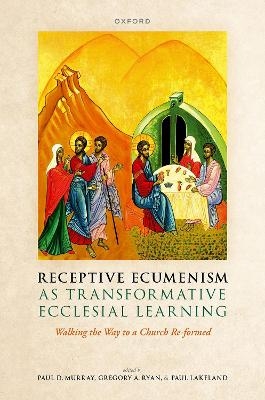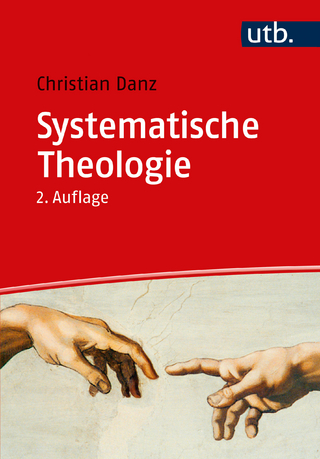
Receptive Ecumenism as Transformative Ecclesial Learning
Oxford University Press (Verlag)
978-0-19-284510-8 (ISBN)
Receptive Ecumenism asks not what other churches can learn from us, but 'what can we learn and receive with integrity from our ecclesial others?' Since the publication of Receptive Ecumenism and the Call to Catholic Learning: Exploring a Way for Contemporary Ecumenism (OUP, 2008), this fresh ecumenical strategy has been adopted, critiqued, and developed in different Christian traditions, and in local, national, and international settings, including the most recent bilateral dialogue of the Anglican-Roman Catholic International Commission (ARCIC III). The thirty-eight chapters in this new volume, by academics, church leaders, and ecumenical practitioners who have adopted and adapted Receptive Ecumenism in various ecclesial and cultural contexts, show how Receptive Ecumenism has grown and matured.
Part One demonstrates how Receptive Ecumenism itself is capable of being received with integrity into very different ecclesiologies and ecclesial traditions. In Part Two, this approach to transformative ecumenical learning is applied to some recurrent ecclesial problems, such as the understanding and practice of ministry, revealing new insights and practical opportunities. Part Three examines the potential and challenges for Receptive Ecumenism in different international settings. Part Four draws on scripture, hermeneutics, and pneumatology to offer critical reflection on how Receptive Ecumenism itself implements transformative ecclesial learning.
Addressing the 70th Anniversary of the World Council of Churches, Archbishop Justin Welby, said that 'One of the most important of recent ecumenical developments has been the concept of "Receptive Ecumenism"'. This volume provides an indispensable point of reference for understanding and applying that concept in the life of the Christian churches today.
Paul D. Murray is Professor of Systematic Theology, Dean of Catholic Studies, and founding Director of the Centre for Catholic Studies at Durham University. He served on the Editorial Board of Concilium International, is a former President of the Catholic Theological Association of Great Britain, a former member of the third phase of work of the Anglican-Roman Catholic International Commission (ARCIC III), on which he continues as consultor, and has also served as consultor to the former Pontifical Council for Justice and Peace. In addition to three books, he has contributed numerous essays to leading journals and scholarly collections. His holds an M.Litt (Durham) and a PhD (Cambridge). Since completing a PhD (Durham, 2018), Gregory A. Ryan has worked on research projects, teaching, and publications in the fields of Receptive Ecumenism and contemporary Catholic ecclesiology, alongside designing and delivering formation programmes for lay and ordained ministry in the North of England. He was formerly Director of Formation for the Catholic Diocese of Hallam, UK. Paul Lakeland is the Aloysius P. Kelley S.J. Professor of Catholic Studies and founding Director of the Center for Catholic Studies at Fairfield University, Connecticut, where he has worked since 1981, with roles including chairperson of the Religious Studies Department and director of the Honors Program. In addition to his PhD from Vanderbilt University, he holds degrees in philosophy, divinity, and English. He is the author of ten books, and editor of two more, in the fields of Catholic ecclesiology, cultural theory, and religion and literature. In 2020 he received the Hellwig Award for outstanding contributions to Catholic intellectual life.
Part I. Receiving Receptive Ecumenism across the Traditions
1: Rowan Williams: Unity and Universality, Locality and Diversity in Anglicanism
2: Paul S. Fiddes: Unity and Universality, Locality and Diversity according to Baptist Thinking about the Church
3: Tamara Grdzelidze: Receptive Ecclesial Learning through Ecumenical Engagement: An Orthodox Perspective
4: Veli-Matti Kärkkäinen: Receptive Ecumenism and the Dynamics of Development within Pentecostalism
5: Donald Bolen: Foundations and Openings for Ecclesial Learning: A Catholic Perspective
6: David M. Chapman: The Call to Holiness: Catholics and Methodists in Dialogue
7: Sarah Rowland Jones: To Receive From Each Other, First Receive Each Other: Receptive Ecumenism and the Global Christian Forum
8: Risto Saarinen and Minna Hietamäki: Finnish Luther Studies, Lutheran Dialogues, and Ecclesial Learning
9: Donald W. Norwood: Reformed Catholicity: Catholic Calvin, Barth, Brown & Co.
Part II. Receiving in Relation to Our Difficulties
10: Anthony T. Currer: Receptive Ecumenism and ARCIC III
11: Paul Lakeland: What Does Rome Have to Learn from Geneva? Whole-Body Ecclesiology and the Inductive Turn
12: Gabrielle Thomas: 'Mutual Flourishing' in the Church of England: Receiving a Gift from the Orthodox Theological Tradition
13: Susan A. Ross: Women's Ministry: A Hidden Opening for Ecumenical Discussion
14: Richard Lennan: Developing Catholic Understanding and Practice of Ordained Ministry through Receptive Learning
15: Peter Phillips: Re-receiving Catholic Eucharistic Theology from the Hymns of John and Charles Wesley
16: Diane Ryan: Not Problems but Pioneers: Interchurch Families and Receptive Ecumenism
17: Linda C. Nicholls: Learning to Love Differently Well: Human Sexuality, the Churches, and Receptive Ecumenism
Part III. Receptive Ecclesial Learning in International Perspective
18: Marcus Pound: Receptive Ecumenism and the Local Church
19: Sandra L. Barnes: Ecumenical Involvement between US Black and White Churches Revisited: Old Obstacles and New Opportunities
20: Agbonkhianmeghe E. Orobator SJ: Receptive Ecumenism in African Perspective: Beyond the Scandal of a Divided Foreign Religion
21: Peter J. Casarella: Receptive Ecumenism in a Latin American Context: Catholic and Pentecostalist Learning in Relation to Mariology
22: Néstor Medina: Unlikely Siblings? Pentecostal Ethico-theological Insights from Catholic Teaching on Mary
23: Geraldine Hawkes: Australian Practices of Receptive Ecumenism
24: Francis X. Clooney SJ: Comparative Theology's Interesting Asymmetries with Receptive Ecumenism
25: John O'Brien: Two-eyed Vision: A Sufi Perspective on the Both/And Structure of Receptive Ecumenism
Part IV. Learning to be Receptive Ecclesial Learners
Discerning the Dynamics of Ecclesial Learning
26: Gregory A. Ryan: A Total Ethic for a Broken Body: Receptive Ecumenism's Hermeneutical Virtue
27: Bradford E. Hinze: What is the Spirit Saying to the Churches through the Laments of the Faithful?
28: Ormond Rush: Revelation, Sensus Fidelium, and Receptive Ecumenism
29: Jeff Astley: What Prevents Christian Churches from Learning?
30: Clare Watkins: Living Church: Practical Theology as a Locus for Ecumenical Learning
Breaking the Bread of the Word Together
31: Mike Higton: Receiving Scripture Again From One Another
32: Vicky Balabanski and Michael Trainor: Learning to be Church: Virtues and Practices Leading towards Koinonia in Colossians and Acts
33: John M.G. Barclay: Interdependence, Need, and Reciprocal Asymmetry in the Body of Christ: A Reading of 1 Corinthians 12
34: David F. Ford: Mature Ecumenism's Daring Future: Learning from the Gospel of John for the Twenty-First Century
Receiving the Spirit of Ecclesial Reform
35: Catherine E. Clifford: Towards a Spirituality of Receptive Ecumenical Learning
36: Callan Slipper: A Discipline for Living According to the Spirit: Chiara Lubich and Receptive Ecumenism
37: Antonia Pizzey: Receptive Ecumenism and the Virtues
38: Paul D. Murray: Growing into the Fullness of Christ: Receptive Ecumenism as a Way of Ecclesial Conversion
| Erscheinungsdatum | 29.09.2022 |
|---|---|
| Verlagsort | Oxford |
| Sprache | englisch |
| Maße | 164 x 240 mm |
| Gewicht | 1032 g |
| Themenwelt | Religion / Theologie ► Christentum ► Kirchengeschichte |
| ISBN-10 | 0-19-284510-1 / 0192845101 |
| ISBN-13 | 978-0-19-284510-8 / 9780192845108 |
| Zustand | Neuware |
| Haben Sie eine Frage zum Produkt? |
aus dem Bereich


